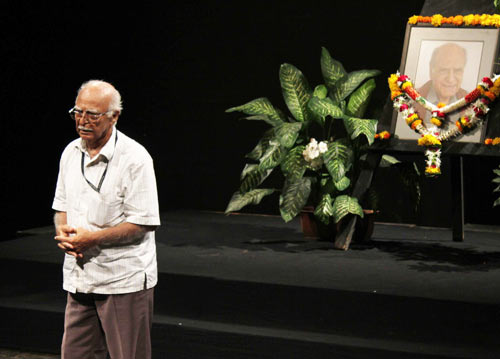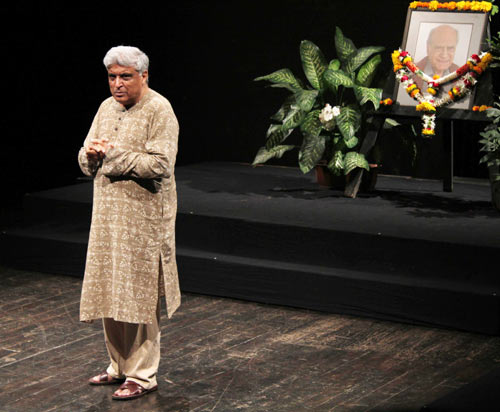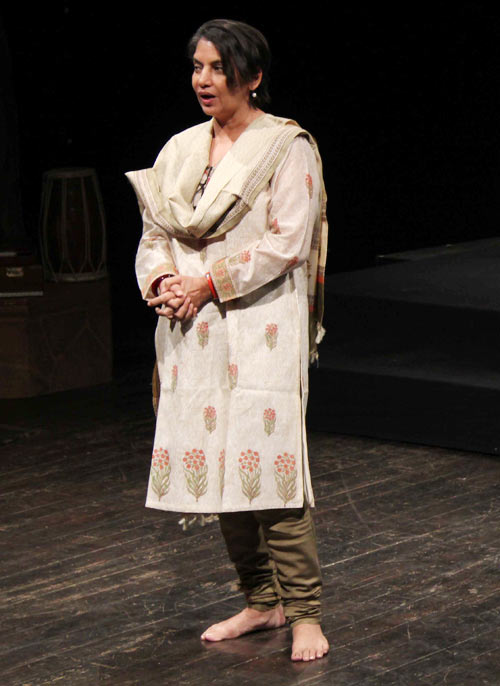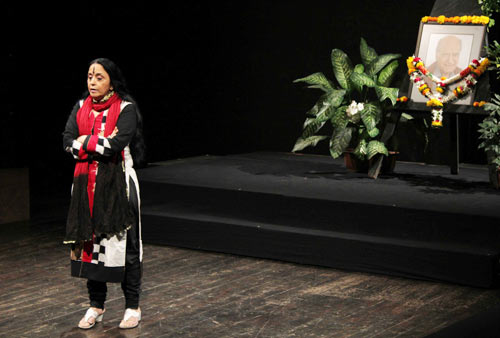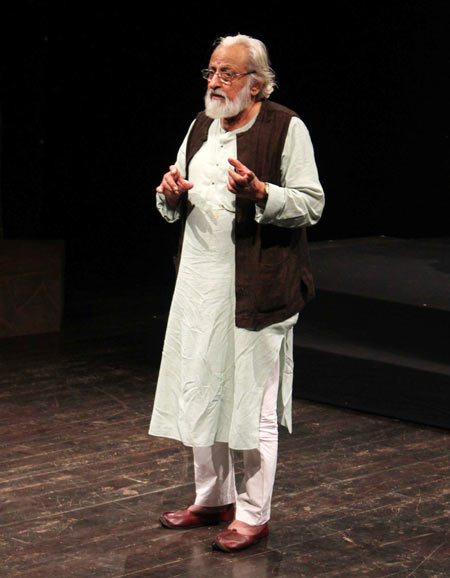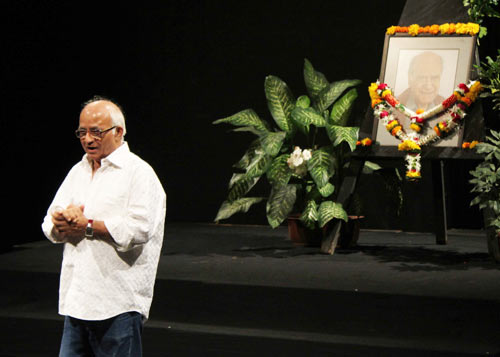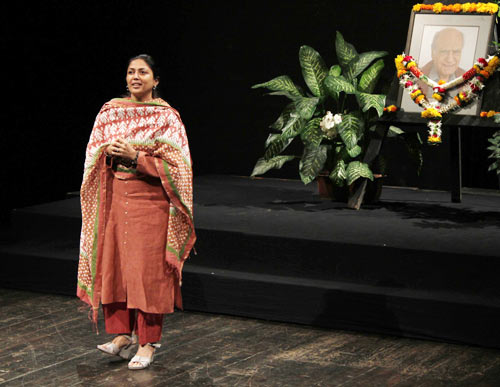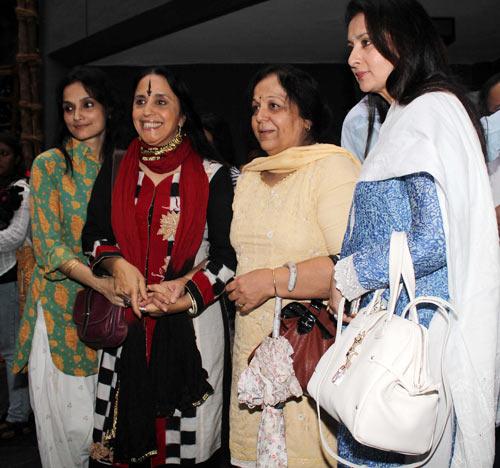 | « Back to article | Print this article |
Shabana, Javed pay tribute to A K Hangal
A day after veteran actor A K Hangal passed away, members of Indian People's Theatre Association (IPTA) paid tribute to him with a small function at Prithvi Theatre in Juhu, a western suburb of Mumbai.
His work with IPTA is not as well known as his films, even though A K Hangal was not initially interested in acting in films. He had heard of IPTA in Pakistan, where he was born, and was quite impressed by their work of spreading social messages through plays.
After he settled in Mumbai, he started hunting for people associated with IPTA. But the theatre movement had disintegrated in Mumbai. So he took the initiative to re-build it.
With the help of poet Kaifi Azmi and veteran actor Balraj Sahani, he rented a place for rehearsals and was completely involved with IPTA.
People like Balraj Sahani and Chetan Anand, who saw his stage work, encouraged him to join movies and that's how he got into movies and became one of the best known character actors of Hindi films.
At the memorial meeting in his honour, IPTA members remembered the actor and spoke about their interaction with him.
IPTA's singers sang songs and actor Anjan Srivastav performed a scene from IPTA's longest running play Shatranj Ke Mohre in which A K Hangal had acted. Actor Rakesh Bedi hosted the function.
Read on to find out what lyricist Javed Akhtar, actress Shabana Azmi and other IPTA members had to say about the late actor.
Javed Akhtar
The first time I met Hangal saab was on the sets of Bawarchi. He played the role of the oldest son of the family Rajesh Khanna goes to work for in the film.
He performed really well and I was impressed. I asked Ramesh Talwar who he was. He told me he is a huge stage name, and his name is A K Hangal.
Later I called Ramesh Talwar and asked if Hangal saab would be interested in a role in Deewar.
Hangal saab would ask weird questions about the role offered to him. For this role he asked, 'How many years have passed since the school teacher has retired?' I had not thought about that, so I told him may be four or five years.
When he played the blind man in Sholay, he worked hard for that too. He thought if a person doesn't have eyes from birth, how would he have the desire to see? Therefore, in the film he adopted the characteristic of shaking one shoulder, and according to him, that shaking shoulder was his desire to see the world.
Every time Hangal saab would ask different and new questions. In Sagaar he played the man in charge of the lighthouse where Rishi Kapoor and Dimple Kapadia always meet.
When he started askign too many questions, I told him it is just a role Hangal saab, just do it.
He had tears in his eyes and said, 'Uss light man ki duniya main kaun hai? Hum uski parva nahi karenge toh kaun karenga' (Who is there in the life of that lightman? If I don't care about him, who will?)
Shabana Azmi
I was nine when I went with my mother Shaukat Azmi and Hangal saab to Hyderabad. They were performing the play Africa Ka Jawan Pareshan. It was an intense play.
For some reason, only eight people came to see the play. A meeting was called and it was decided that the play should be called off and all the eight people should be given their money back.
But my mother and Hangal saab, who played the lead role in the play, said nothing doing, the school that we belong to has taught us that the show must go on so we will perform the show for eight people. Why should these people suffer?
And they gave a brilliant performance that day
I have worked with Hangal saab in many films. One day I was working with Sanjeev Kumar and asking many questions about my role. Sanjeev Kumar said, 'Hangal saab ke saath kitne dino se kaam kar rahi ho, hangalagayi ho kya.'(How long have you been working with Hangal saab? You have the Hangal effect on you).
Ila Arun
My family and I feel we have lost our father.
Hangal saab and I were neighbours in Santacruz. It was Hangal saab who asked me to live in Santacruz so that I could stay closer to Prithvi Theatre.
M Sathyu
His dressing sense was meticulous. He dressed well, whether for plays or films. He once played a film producer in a play and the way he imitated the producers and their dress sense was excellent.
He was very disciplined in life, but on one occasion he lost the tickets of all the members who were going to perform a play at some outstation centre!
He adapted his acting when he went from theatre to films; he never exaggerated his acting in films like we do in plays.
Ramesh Talwar
Hangal saab always felt that I never wore clothes of my size. Once I performed a play Aakhri Sawal in a role that was earlier played by Hangal.
After the play I went and asked him how I fared in his role. He said everything was good but your clothes were ill-fitting!
Lubna Salim
I worked with Hangal saab when I was just eight.
After his death, it was said in the newspapers that Hangal saab was alone in his last days. That is not true. He was not alone. All us members of IPTA met him regularly and we were there in his last days too.
Just because people from Bollywood did not come (to his funeral) that is not the end.
In fact, for Hangal saab, his actual family was the people from IPTA.
Sulbha Arya
He was a perfectionist; his acting would start in the wings itself. In the scene where he had to play an angry person he would start fuming in the wings and whoever spoke to him at that time would be blasted.
When we were acting in Shatranj Ke Mohre he once got upset with the person who had arranged the props on the set. He said that the arrangement of the chair has shifted by a few inches as when he finished the dialogue, the chair was not in that position.
Once an actress forgot her lines and later improvised. But Hangal did not respond to the new dialogue that she said as it was not in the script.
